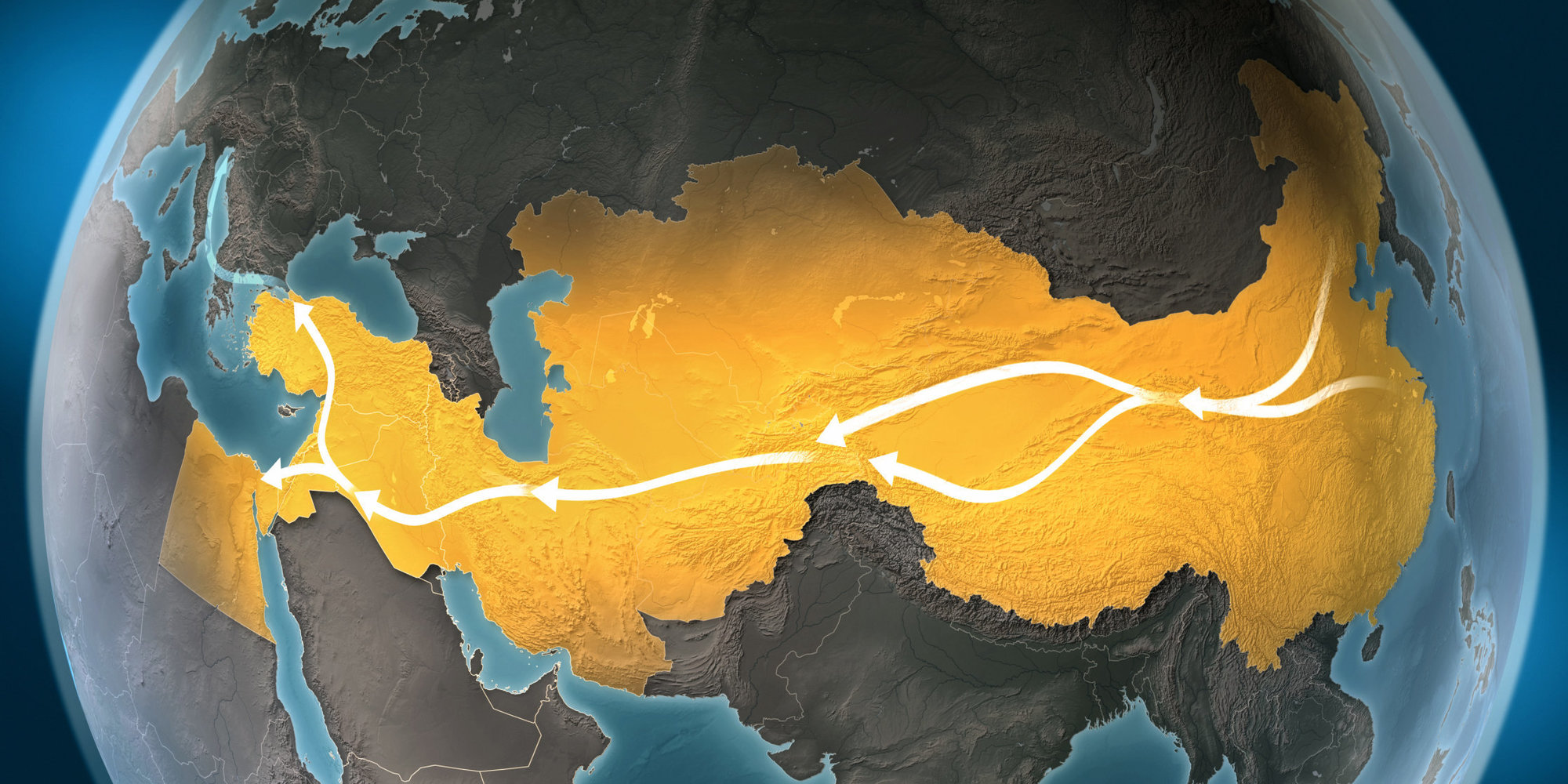中国新丝绸之路计划在非洲成形 [美国媒体]
四年以来数百亿美元过后,中国雄心勃勃的全球贸易战略,“海上丝绸之路”或者称作“一带一路,现在正在变成现实,特别是在东非的部分地区,主要的基础设施建设和国防安全项目正在建设中。美国网友评论中国正在征服世界,只是没有通过国彷预算、子弹和入侵的方式进行,有网友称西方没能认识到的是21世纪属于东方。
Four years and some hundreds of billions of dollars later, China’s ambitious global trading strategy known as the “Maritime Silk Road” or “One Belt, One Road“ is now coming to life, particularly in parts of East Africa where major infrastructure and defense projects are being built. New ports in Tanzania, rail lines in Kenya, naval facilities in Djibouti and industrial zones along the Suez Canal in Egypt are all intended to support this massive new trade network that President Xi Jinping hopes will become a key pillar of his foreign policy agenda.
四年以来数百亿美元过后,中国雄心勃勃的全球贸易战略,“海上丝绸之路”或者称作“一带一路,现在正在变成现实,特别是在东非的部分地区,主要的基础设施建设和国防安全项目正在建设中。坦桑尼亚的新港口,肯尼亚的铁路线,吉布提的海军设施和沿埃及苏伊士运河的工业区都被用来支撑这个庞大的新贸易网络,习近平主席希望这个贸易网络能够成为他的对外政策议程的关键支柱。
With the first phase of construction nearing completion in East Africa, focus is now shifting to the next stage where Chinese planners are reportedly expanding the trading route inland into Central Africa. This is prompting intense new lobbying battles among African countries to win Beijing’s favor and the billions of dollars of badly-needed infrastructure investment that come with being a node on the “One Belt, One Road” network.
随着在东非的第一阶段建设接近完成,现在的重点转向了下一个地点,据说中国的规划者正在把贸易路线扩大到非洲中部。这正在促使非洲国家展开一场新的游说战来赢得北京的青睐,赢得能让自己成为“一带一路”网络上的一个节点所急需的数十亿美元的基础设施投资。
Many outsiders know very little about “One Belt, One Road” and its history. The incorrect assumption is that this is a new phase of Xi’s more assertive global foreign policy designed to challenge the U.S.-led international economic order. In contrast, OBOR is rooted in a decade-old policy that was actually designed to counter fears of a hegemonic China. The so-called “Peaceful Rise” or “Peaceful Development“ was first introduced by former Chinese President Hu Jintao when he promoted the concept of fusing China’s expanding foreign policy objectives with a development agenda and a global trading strategy.
许多外行人对“一带一路”及其历史知之甚少。一个不正确的解读是这是习更加自信的设计用来挑战美国主导下的国际经济秩序的对外政策的一个新阶段。与此相反,一带一路扎根于一项实际上用来消除对霸权主义中国的担忧的十年决策。即所谓的“和平崛起”或称“和平发展”,由前中国主席胡锦涛在他推动将中国扩大的对外政策目标与一项发展议程和一项全球贸易战略相融合的概念时所第一次提出。
Matt Ferchen is an associate professor of international relations at Tsinghua University and a resident scholar at the Carnegie-Tsinghua Center for Global Policy where he is a leading OBOR expert with a particular focus on how the venture will impact the Global South. Matt joins Eric & Cobus — in the podcast above — to discuss the new politics of Chinese trade.
Matt Ferhen是一位清华大学的国际关系学副教授、卡耐基-清华全球政策中心的常驻学者,在那里他是一位领导性的一带一路权威专家,特别聚焦于这项冒险将如何影响南半球。Matt参加了一个播客节目Eric&Cobus,讨论中国贸易新决策。
Lisa Barton · 10 hrs +5
At the end of every war, there needs to be a time for peace and restructuring. China is conquering the world -- just not through a defense budget and bullets and invasions -- all of those strategies still need require a way to come together and rebuild and forge new relationships between nations. Instead, China goes into a country with diplomats, makes trade deals (which are usually pretty exploitive still) and takes the country's raw materials back to China. They've done it around the world. While US taxpayers are running up debt paying off mercenaries and war profiteering companies like Halliburton adn KBR in Afghanistan, China's mining their minerals and making a profit. The US should pay attention...and learn something from them.
每一场战争结束时,都需要一个和平与重建的时间。中国正在征服世界,只是没有通过国彷预算、子弹和入侵的方式进行,这些战略还需要一种能够汇集在一起的方法和重新建立锻造新型国际关系。作为代替,中国让外交人员进入一个国家,签定贸易协议(通常都是很好的资源开发协议),将该国的原材料运回中国。他们在全世界都这样做。与此同时,美国纳税人正在为在阿富汗的雇佣军和唯利是图的Halliburton和KBR这样的军火商负担开支,欠下巨额债务,而中国正在开采他们的矿场并取得利润。美国需要注意了,,,还有从他们身上学些什么吧。
Molari Smith · 13 hrs +4
Seems they are investing in their economic future by building the same 'super trade highway'. This story appears to show that they investing in a sort of rising "Asian/Middle East/Eastern African trade block".
看起来他们正在通过建设相同的“超级贸易高速路”来投资他们的经济未来。这个故事似乎表明他们正在投资于一种新兴的“亚洲/中东/东非贸易圈”
Andrew B. Suhrer · Works at Novelist/Writer · 8 hrs +1
The concept of one belt, one road is nothing more than a public works spending project. We're talking about people who build entire cities no one lives in. The thought that the Chinese are somehow going to succeed in Africa is laughable. They're repeating what the Japanese did back when everyone was saying they owned everything, which is to blow their money like drunken sailors.
一带一路概念无非是一个公共支出项目。我们谈论的是建造了整个城市的人没有一个人入住{说的鬼城}。认为中国人某种程度上能在非洲取得成功的想法是可笑的。他们正在重复做日本人所做的像一个喝醉的水手似地往外扔钱的事,当时每个人都说日本人拥有了一切。
Jing Wei · San Jose, California · 3 hrs
you are either grossly misinformed or need to update your knowledge. The so called "ghost" cities western media was so hyped about, majority of them are already occupied. It's market economy, developer had to lower the price so now people are buying them like crazy. China build infrastructures for other countries, while US bomb them.
你要么被严重地误导了,要么就需要更新你的知识。所谓的“鬼城”被西方媒体如此炒作,实际上它们中的大部分早就住上了人。因为是市场经济,开发商不得不降低了价格,现在人们都疯抢着购买。中国为其它国家建设基础设施,而美国轰炸它们。
Joseph Poe · 3 hrs
What the west fails to realize is that the 21st belongs to the east. Africa is the golden continent and china's move into it through business deals and not with a superiority complexs which wouldn't work anyhow in this century, is why it will work. All of the tech can be duplicated between the countries so there's no need for America tech sooner than later. They have the resources and manpower between the two civilizations to create the largest middle class on the planet. So there's nothing that can stop this! Especially, not the I.M.F. which is debt driven and creates money out of thin air, backed by nothing!
西方没能认识到的是21世纪属于东方。非洲是一座黄金大陆,中国通过商业贸易进入这片大陆,而没有在21世纪不再起作用的自以为优越的傲慢,这就是为什么中国取得成效的原因。所有的技术都可以在这些国家间复制传播,所以早就没有对美国技术的需求。他们有两个文明体系的资源和人力来创造出这个星球上最大的中产阶级。所以没有何任事情能阻挡这一点{指21世纪属于东方}!特别是,靠债务驱动、凭空印钞票的IMF不能,它什么倚仗也没有!
版权声明
我们致力于传递世界各地老百姓最真实、最直接、最详尽的对中国的看法
【版权与免责声明】如发现内容存在版权问题,烦请提供相关信息发邮件,
我们将及时沟通与处理。本站内容除非来源注明五毛网,否则均为网友转载,涉及言论、版权与本站无关。
本文仅代表作者观点,不代表本站立场。
本文来自网络,如有侵权及时联系本网站。
下一篇: 经济学人:悲剧性的分裂 [美国媒体]
图文文章RECOMMEND
热门文章HOT NEWS
-
1
Why do most people who have a positive view of China have been to ...
- 2
- 3
- 4
- 5
- 6
- 7
- 8
- 9
- 10
推荐文章HOT NEWS
-
1
Why do most people who have a positive view of China have been to ...
- 2
- 3
- 4
- 5
- 6
- 7
- 8
- 9
- 10











